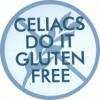-
Welcome to Celiac.com!
You have found your celiac tribe! Join us and ask questions in our forum, share your story, and connect with others.
-
Celiac.com Sponsor (A1):
Celiac.com Sponsor (A1-M):
-
Get Celiac.com Updates:Support Our Content
Candida & Celiac
-
Get Celiac.com Updates:Support Celiac.com:
-
Celiac.com Sponsor (A17):
Celiac.com Sponsor (A17):
Celiac.com Sponsors (A17-M):
-
Recent Activity
-
- Jmartes71 posted a topic in Coping with Celiac Disease0
Curious question
So I've been dealing with chasing the name celiac because of my body actively dealing with health issues related to celiac though not eating. Diagnosed in 1994 before foods eliminated from diet. After 25 years with former pcp I googled celiac specialist and she wasn't because of what ive been through. I wanted my results to be sent to my pcp but nothing was... -
- Amy Barnett posted a topic in Gluten-Free Foods, Products, Shopping & Medications0
Question
What is the best liquid multivitamin for celiac disease? -
- Jmartes71 posted a topic in Coping with Celiac Disease0
Alarming
I've noticed with my age and menopause my smell for bread gives me severe migraines and I know this.Its alarming that there are all these fabulous bakeries, sandwich places pizza places popping up in confined areas.Just the other day I suffered a migraine after I got done with my mri when a guy with a brown paper bag walk in front of me and I smelled that... -
- Maggieinsc commented on Scott Adams's article in Winter 2026 Issue5
Celiac Disease and Longevity: Can Treatment and Healing Improve Long-Term Survival?
Thanks for the prompt reply. Interesting that blood test could be caused by other things. I am sure Dr Fincher will get to the bottom of it. I know he ate nowhere near that amt of gluten before the endoscope. Always interested in any new info abt celiac. U can not trust what is said on fb- That would be a piece of bread a day. He didn't even make that...- autoimmune disease
- celiac disease
- (and 7 more)
-




Recommended Posts
Archived
This topic is now archived and is closed to further replies.